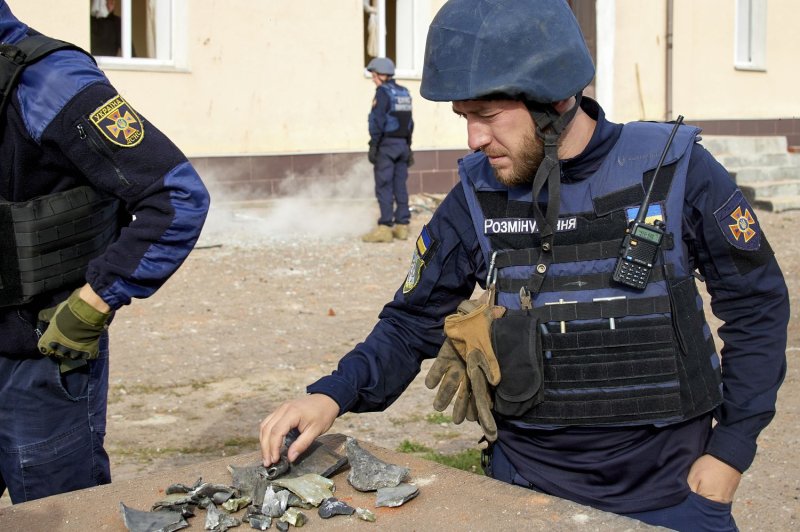Ukrainian policeman inspects the debris of a rocket near a recently shelled school in Kharkiv, Ukraine, on Saturday amid Russia's military invasion. Kharkiv and surrounding areas have been the target of heavy shelling since February. Photo by Sergey Kozlov/EPA-EFE
Sept. 4 (UPI) -- A 9-year-old boy was killed and at least 10 people were seriously injured in a Russian rocket strike in the southern Ukrainian town of Zelenodolsk as Ukrainian forces have pushed their counteroffensive in the south of the country.
The news of the rocket strike Saturday came as a report from Conflict Armament Research, an independent armed conflict investigation group based in Britain, revealed that Russia has been using outdated foreign technology in its advanced missiles systems and helicopters.
Valentyn Reznichenko, the governor of the Dnipropetrovsk province, said in a statement to Telegram that Russian forces fired Uragan rockets at Zelenodolsk which hit eight high-rise buildings, shops, a kindergarten and a medical school.
"Russians killed a 9-year-old boy," Reznichenko said in the statement, claiming that Russian forces "aim Uragans at children."
Reznichenko added that "there are no words" to describe the devastation and that "payback will come."
Suspilne News, a public broadcaster in Ukraine, reported Sunday that six children were hospitalized during an explosion at a street fair in Chernihiv on Saturday. Two of the children remain in the hospital.
At least 365 children have been confirmed to have been killed and another 623 injured by Russian forces since the start of the invasion on Feb. 24, according to the most recent data from the office of the U.N. High Commissioner for Human Rights on Aug. 29.
"And these are just the figures the U.N. has been able to verify. We believe the true number to be much higher," Catherine Russell, the executive director of the United Nations Children's Fund, said in a statement on Aug. 22.
"The use of explosive weapons has caused most of the child casualties. These weapons do not discriminate between civilian and combatant, especially when used in populated areas as has been the case in Ukraine -- in Mariupol, Luhansk, Kremenchuk, and Vinnytsia. The list goes on and on."
The death of the child comes just as Ukrainian children are returning for the new school year, as schools have been targeted by Russian forces.
"We estimate that 1 in 10 schools have been damaged or destroyed," Russell said."All children need to be in school and learning, including children caught up in emergencies. Children in Ukraine and those displaced by this war are no exception."
In its report on Russian advanced weapons systems, CAR said Saturday that its field investigation team traveled to Ukraine in mid-July to document items that Ukrainian officials had recovered from Russian weapons, including components from a Ka-52 helicopter, multiple cruise missiles, and drones.
CAR identified that components used in the weapons came from 144 non-Russian manufacturers and were made after 2014, when Russia illegally annexed the Ukrainian territory Crimea leading to initial sanctions from the European Union and United States.
"The Russian Federation's ability to develop advanced weapon systems such as cruise missiles is thus highly reliant on very specific non-Russian technology," the report reads.
CAR found that Russia uses identical components in the on-board computers for the Kh-101 missile and Ka-52 helicopter, showing Russia's reliance on foreign technology from U.S. companies as well as those in Asia and Europe.
"CAR continues to investigate the exact chains of custody to the Russian defense industry, mainly by tracing these components with their manufacturers to confirm their provenance and how they came to be present in Russian weapons," the report reads.
"The trace requests will help to inform companies and governments on the presence of such components in advanced Russian weapon systems."
The report, which undermines Russia's claims that its military technology rivals those of Western forces, comes as Russian troops continue to suffer "low morale and discipline issues," according to the British Defense Ministry.
British intelligence shows that Russia continues to fails to pay soldiers fighting in Ukraine, and that troops are suffering "combat fatigue and high casualties."
"In the Russian military, troops' income consists of a modest core salary, augmented by a complex variety of bonuses and allowances. In Ukraine, there has highly likely been significant problems with sizeable combat bonuses not being paid," the British Defense Ministry said Sunday.
"This is probably due to inefficient military bureaucracy, the unusual legal status of the 'special military operation', and at least some outright corruption amongst commanders."
Meanwhile, an analysis from the Institute for the Study of War, a think tank based in Washington, D.C., Saturday found that "the ongoing Ukrainian counteroffensive in southern Ukraine is an intentionally methodical operation to degrade Russian forces and logistics" rather than aimed at recapturing occupied territory.















